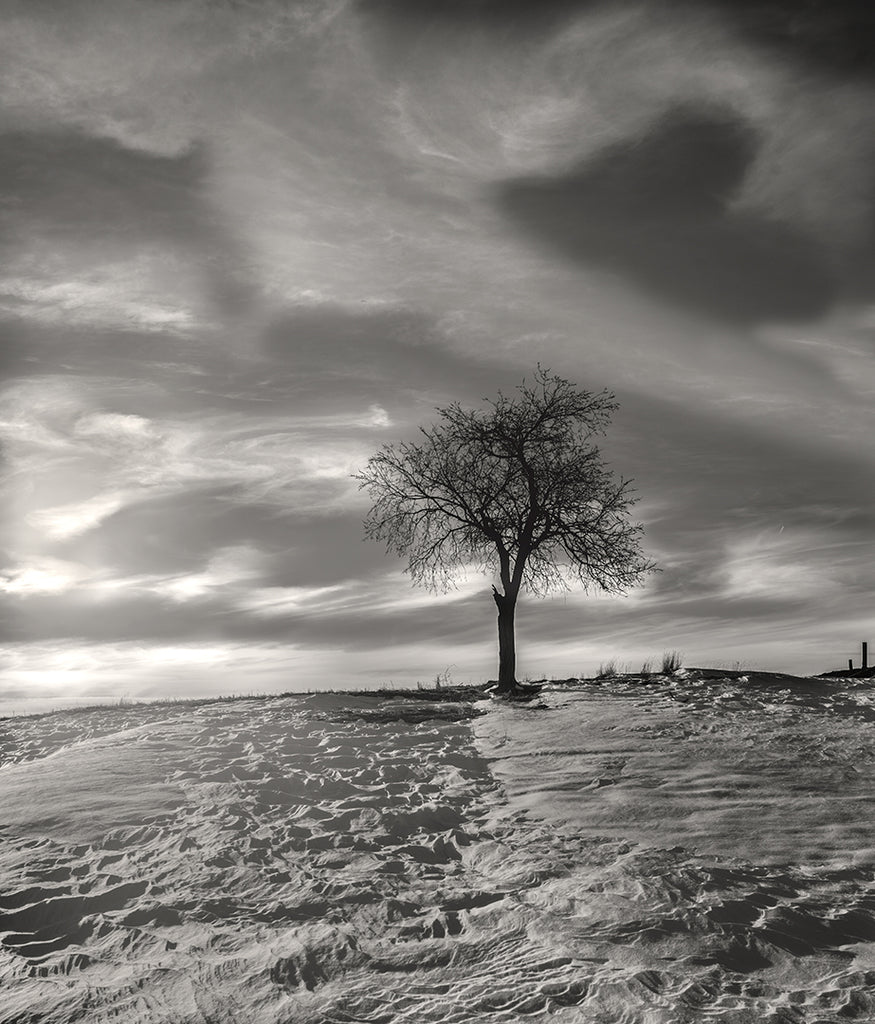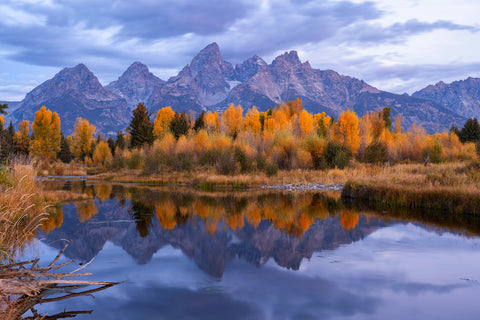A few nights ago, as store heaters clicked on behind locked doors, and the climate-controlled cabs of passing cars displayed their temperatures in precise, digital readouts, a woman froze to death in Billings, Montana.
Less than three weeks earlier, it was a man. He lay down on a sidewalk, pulled a satiny sleeping bag - the kind I might use on a summer night when my only care is wondering if clouds will roll in and ruin a star trails picture - up over his head, and shivered until he died.
It's been a hell of a winter in Montana, and it's not over yet. A ride through the central part of our state looks like a tour through the Siberian Steppes. Hundreds of square miles devoid of the tracks of anything living. An oceanic expanse of wind-sculpted snow, packed deep and hard, refusing to relinquish its death grip on a landscape that should be solidly into early spring. The occasional rough legged hawk crouches on a power pole, white chest feathers rippling in the incessant north wind, grey-gold eyes scanning for voles, most of which never venture from their subterranean burrows. Apart from him, there is nothing.
That's Nature, I think, as my tires pull through a two-foot drift across the little road I'm driving along. Its animals always, even on easy winters, compete for the thinnest margins of victory in the game of survival. Stopping to look out across acres of sage where only the tips of the bushes peek above the snow, it looks like this year Winter is wrapping up a no-hitter, still throwing a hundred miles an hour in the bottom of the ninth.
Fifty miles south in Billings, where refineries work around the clock producing gasoline, artisan coffee shops serve dark, rich espresso, craft stores peddle artificial plants and wood-carving kits, and the nation's fourth-largest-grossing Walmart sells everything from winter tires to fresh cilantro, people can still die of exposure during a winter like this.
We call them "transients," giving them a politically-correct name that rolls more easily off the tongue - and our conscience - than "homeless." A name that softens the reality of it, not for them but for us.
In the distance, grainy snow blows from the top of a drift seven feet deep, curling into the sky like an icy dust devil. We are all transients, I think, as I churn ahead, but most of us don't rely on a thirty-nine dollar sleeping bag to keep us warm on below-zero nights. Most of us have a home. A place that we are so familiar with that something as simple as moving the location of our kitchen garbage basket will throw a wrinkle into our routine - try it if you don't believe me, and see how often you head to its previous location with dripping egg shells or a soaked paper towel.
On a rise where my road begins falling off toward the Mussleshell River Drainage, a fuzzy line of cottonwoods fifteen miles away, I park and watch a tumbleweed freed from the highest strand of wire on a fence skitter across the snow. It slides more than rolls and then suddenly, bestowed with the power of flight, springs into the air and spirals up thirty feet. A strong gust of wind hurls it south, across the road in front of me, then dashes it to the ground where it resumes its earth-bound slither. I watch it until it vanishes, swallowed by an invisible fissure in the land, one of the prairie's many unseen dips and draws. One instant it is there, and the next it is simply gone.
I wonder if that's how it was for the man and woman who died on the streets of Montana's largest city? One breath here, one instant later no more. The blink of an eye, the beat of a heart, the tiny, involuntary twitch of a finger or infant beginning of a dream, and then an irrevocable relocation to some other dimension.
Drugs or alcohol may have been a factor in both deaths the newscast I listened to said before an uptempo, electric guitar began its intro to the next song on the radio. There was no mention that Montana has just cut nearly 2 million dollars from its Medicaid insurance programs designed to help people battling those addictions. Nine hundred thousand dollars of state funds and, because our federal government has pledged matching amounts to whatever our state can spend to fight this epidemic, nine hundred thousand dollars there, too.
In the dooryard to a long-gone homestead, marked only by a single, defiant tree and rusting frame of a hay rake, I park and turn my truck off. I grew up in an era when addiction wasn't labeled a disease. When it was the chosen route of someone weak of mind or lacking morals. When it was treated punitively through incarceration and social ostracizing. When we addressed our family member's struggle in whispers or, more frequently, not at all.
We have moved forward since then. Scientific advances have allowed us a better understanding of how the brain and body respond, uncontrollably, to the psychological and physiological effects of chemicals. Therapy-based treatments have proven more effective than punishment-based prison sentences, and a system of support has been shown to best prevent relapse. And yet, at the height of a nationally-declared opioid epidemic, when major US drug companies have admitted their sales practices of pain killers have been irresponsible, when methamphetamines and heroine are readily available in every corner of America, when our nation struggles with growing numbers of people hooked on the most potent chemicals our bodies have ever been exposed to, we will strip money away from the avenue to hope. We will cut from those whose voice is to weak to protest. We will label our neighbor - and, as prevalent as drug use has been become, that is not an exaggeration - as undeserving of the level of assistance we deemed necessary just last year.
It is virtually unheard of for the addict in the early stages of dependency to seek help. It is not until a rock bottom far below what many of us can entertain as possible has been reached that the person afflicted with addiction walks through the door of a treatment facility. Life by then has devolved into something barely recognizable by even the most common standards we take for granted to bound daily existence. Jobs have been lost, family units destroyed, dignity left by the wayside, and any sense of self worth subjugated by a body's need for its next high. Fourteen-year-old girls will sell themselves, and fifty-year-old men will steal from their incapacitated parents, beating them if they object. The man and woman on the street, for whom drugs and alcohol play leading roles in their deaths by exposure, have no path to wellness save perhaps Medicaid insurance. To think otherwise, is as misguided as to believe "transient" implies a lifestyle akin to backpacking through Europe as a privileged, American teen.
Part of our history as a species is written in needle tracks on arms, pocked faces of meth addicts, unblinking stares of heroine users, and the patterns of broken car window glass, smashed in the dead of night by someone hoping for a wallet under the seat or an iPod in the center console. History will record that, alongside decisions to chip away at the catch-nets of social assistance. To take more from those who have already lost everything. To empower ourselves by hurting instead of helping. To devalue and marginalize and categorize not addicts or transients or the mentally ill, but fellow human beings. Instead of stripping away their funds, we should remove their labels. They are people. Men and women born to fathers and mothers. Children who laughed and cried and dreamed exactly as the rest of us. Mirror images of us, save perhaps one fateful decision.
Montana spent millions upon millions of dollars fighting the worst forest fires in our state's history last summer. Brave volunteers died battling these blazes, and most were only extinguished when they ran out of fuel to burn or by major weather events. Our state coffers were emptied, and now those among us least likely to object, least apt to raise a concerted voice at the polls, least prone to public outcry will pay a price. That is our response, and it will be written, too.
*
It's cold inside my truck when I crank the engine, but a hell of a lot warmer than it was when two people froze to death sixty miles away. Before I shift into reverse and begin my sojourn back, I stare at the bare tree in front of me, billowing clouds streaming past on the same north wind that's blown all day. A picture, I decide, of this place on this day if for no other reason than to prove I was here. I step out into the wind, focus quickly, my hands already feeling the bite of a bitter cold, and just before I press the shutter notice that the clouds above the tree, their finger-painted appearance smearing the horizon, have formed a heart. It's incongruous with everything I'm feeling, but sometimes that, too, is Nature. I wonder if there's any chance it's some type of sign - one from that other dimension we will all eventually transition to? I click my shutter and, as if by way of reply, watch the clouds shift and feel the sting of wind-driven snow on my face.
** You can view this feature photograph, Frozen, and many other new pictures by clicking on this link and visiting my New Releases section of this web site.
https://jakemosher.com/collections/new-releases




Stephen Moulton
Great article Jake. I live in Billings and it’s been a hard winter. As you I’m Northeast Kingdom kid. Was raised in East Charleston and moved out here as I just can’t seem to get enough of Montana. Great pictures also.
Tanya Sousa
“….just before I press the shutter notice that the clouds above the tree, their finger-painted appearance smearing the horizon, have formed a heart. It’s incongruous with everything I’m feeling, but sometimes that, too, is Nature. I wonder if there’s any chance it’s some type of sign – one from that other dimension we will all eventually transition to? I click my shutter and, as if by way of reply, watch the clouds shift and feel the sting of wind-driven snow on my face.” WOW. Is there anything else to say?